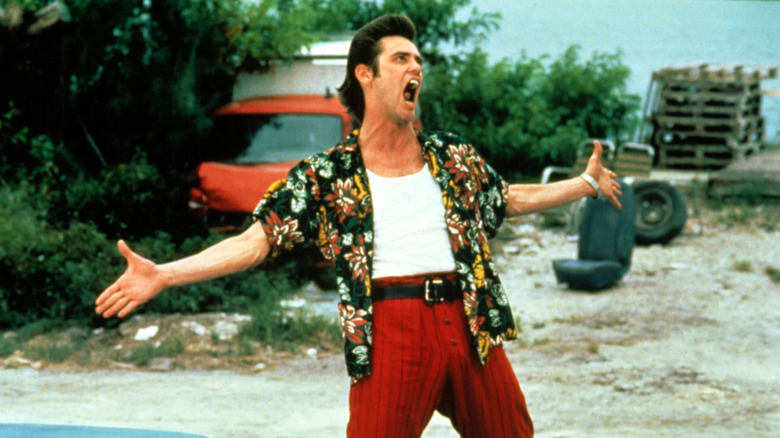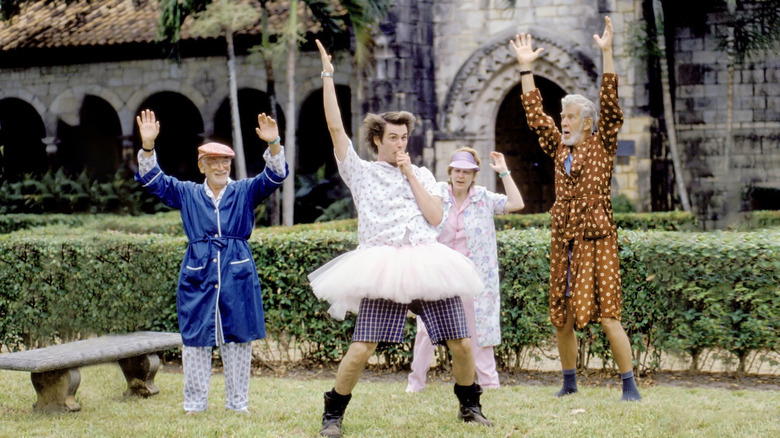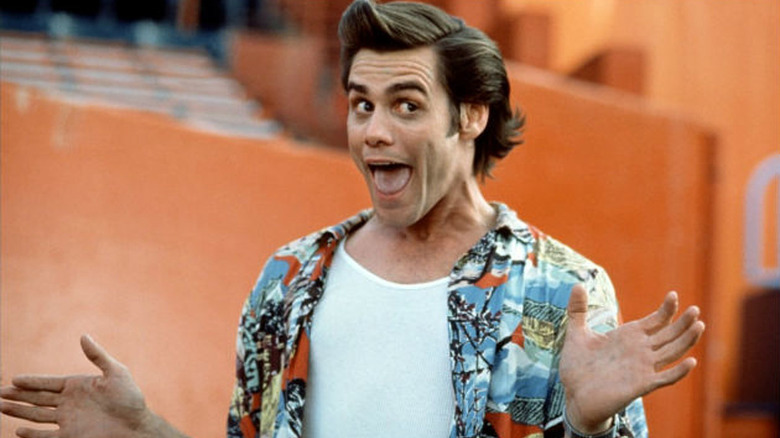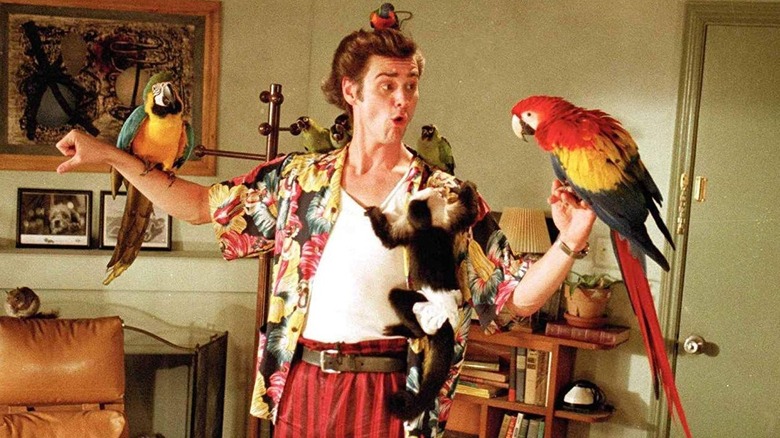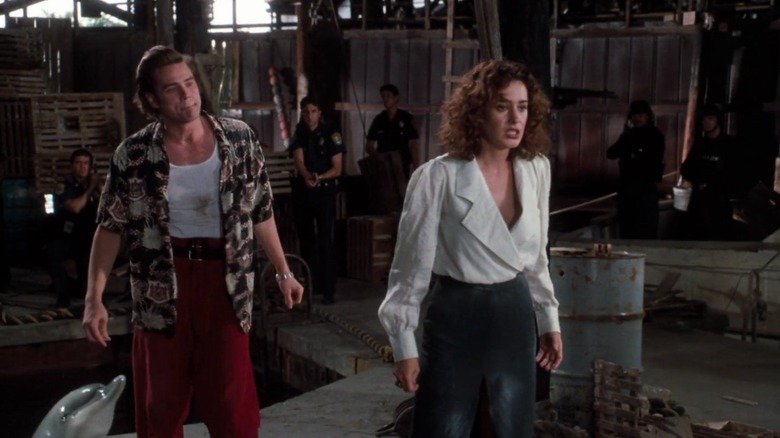Jim Carrey Knew Audiences Would Either Love Or Hate Ace Ventura: Pet Detective
It's fair to say that certain aspects of the "Ace Ventura" movies don't play well at all nowadays; even at the time, the original film was called out for its rampant homophobia and transphobia. Putting the really problematic aspects (which we'll touch upon later) aside for a moment, let's not forget what an utterly unique force of nature Jim Carrey was when he burst onto our screens as Ace for the first time.
We hadn't really seen anything like it. Roger Ebert compared him to Jerry Lewis, but he was restrained by comparison. At his peak, Steve Martin did zany just about as well as anybody and Robin Williams was capable of leaving us breathless with his whirl of free-association improvisations, but they both seemed fully in control of what they were doing. Carrey, on the other hand, seemed so wildly out there, like a live-action cartoon character.
As a shy teenager, his early movies really hit home for me. The idea of strutting around like Ace, totally unhindered by social conventions and not giving a flying toss what anyone thought of you was incredibly appealing. His performances gave me a little boost of confidence, putting a little swagger in my step, at least as long as it took to walk from the cinema to the bus station for the ride home. I even bought a Hawaiian shirt like Ace's and wore it on nights out, something that was definitely not the usual attire in my provincial hometown in the mid-'90s.
Carrey took plenty of risks in how far he pushed the envelope, which was arguably the sole reason "Ace Ventura: Pet Detective" was such a surprise hit. Audiences ate it up, but the actor later confessed even he wasn't sure if it would fly or not.
So what happens in Ace Ventura: Pet Detective again?
Ace Ventura (Jim Carrey) is a Miami pet detective who loves animals so much that he shares his small apartment with about a hundred of his "jungle friends." His cases frequently bring him into contact with the disapproving police, and his nemesis Lieutenant Einhorn (Sean Young) hates the very sight of him. However, while the regular cops make fun of him, he's far more wily than his outlandish methods suggest.
His next big case arrives when the Miami Dolphin's mascot, a dolphin named Snowflake, is kidnapped two weeks before the team plays in the Superbowl. The first clue is a stone from a championship ring, which leads him to suspect that a former Dolphins player might be involved. Can Ace find Snowflake in time to give the team that all-important morale boost before the big game?
The back-of-a-napkin mystery is completely throwaway, a vague semblance of a plot to enable Carrey to do his thing. It's never less than completely juvenile, with Ace doing silly voices, pulling faces, and literally talking out of his arse. And Carrey was spectacularly good at throwing every atom of his being at that stuff.
There isn't much to the film beyond Carrey, and it's very much of its time. Rapper Tone Loc shows up, as does a young Courtney Cox and Miami Dolphins legend Dan Marino. Meanwhile, "Blade Runner" star Sean Young was attempting a comeback after her struggles with alcoholism and essentially becoming blacklisted for her erratic behavior (via Daily Beast). Carrey lobbied hard for Young to get the part of Einhorn and she praised him for fighting her corner, but sadly what a humiliating role it turned out to be.
Jim Carrey wasn't first choice for Ace Ventura
Jim Carrey's early cartoonish screen persona is so perfect for "Ace Ventura" that it's almost impossible to imagine anyone else in the role, yet he wasn't the first choice to play the pet detective. The producers originally offered the part to Rick Moranis, who still had a few more hits in him before vanishing from the radar in the 21st century. He turned it down. Other names considered were Judd Nelson, Alan Rickman, and Whoopi Goldberg.
Out of those four, the only one I can picture playing the part is Goldberg. She had bundles of energy in her heyday and she was on a roll at the time, becoming the highest-paid female actor in Hollywood for "Sister Act 2." Eventually, Carrey's performances in the comedy show "In Living Color" persuaded the producers to give him a shot, and he had a very clear idea about how to play Ace (via Los Angeles Times):
"From the beginning of my involvement, I said that the character had to be rock 'n' roll. He had to be the 007 of pet detectives. I wanted to be unstoppably ridiculous, and they let me go wild."
According to director Tom Shadyac, early versions of the script were more in the style of "Fletch," Chevy Chase's comedy thriller from the '80s (via Looper). At first, Carrey even played Ace with a far more reserved delivery before Shadyac saw one of his stand-up performances, which made the director realize that was the way his star should play the character. He cut the comedian loose to rewrite the script and improvise on set, resulting in the Ace Ventura we all know today.
Carrey was worried he'd gone too far
We now know that Carrey is an actor capable of great subtlety, but who knew at the time? He had a few small film roles in the '80s but they gave little indication of what he would do when he got his big break, and the wild excesses of his performances in "Ace Ventura: Pet Detective," "The Mask," and "Dumb and Dumber" made him a household name. Nevertheless, he was concerned that he might have gone too far with it at the time, as he told Roger Ebert:
"I knew that this movie was either a hate-it or love-it thing. The only thing that bothered me about the negative reviews was that we didn't get credit for trying something that was all the way out. No holds barred. When you get a script like 'Pet Detective,' if you try to play it real, it would have been boring as hell. Horrifying. So, I was looking to do something that was really unacceptable."
It was certainly unacceptable for some. Ebert gave the film one star and concluded his review (via Roger Ebert):
"I found the movie a long, unfunny slog through an impenetrable plot. Kids might like it... Real little kids."
Ebert wasn't the only critic who hated it, but it was one of those real "what do critics know?" situations. The film was a sleeper hit and racked up over $107 million worldwide (via Box Office Mojo) off a $15 million budget and propelled him towards superstardom, with a sequel, "Ace Ventura: When Nature Calls" also smashing it at the box office. Carrey definitely needn't have worried about whether people were going to hate it or not.
Does Ace Ventura: Pet Detective still hold up?
"Ace Ventura: Pet Detective" is still pretty funny thanks to Carrey's uninhibited performance, but even that's tainted by the outrageously transphobic content. In the supposed twist, Lieutenant Einhorn is actually the villain of the piece, Ray Finkel. Finkel lost his mind after missing an easy field goal in the 1984 Super Bowl, which he blamed on Dan Marino. In an elaborate scheme, he assumed the identity of a missing woman, joined the police force, climbed the ranks, and orchestrated the dolphin abduction, all to get revenge on Marino and the team.
It's absolute nonsense and just one long set-up for the big reveal. First, when Ace figures out Einhorn is Finkel, we get a montage of him throwing up, eating a whole tube of toothpaste, burning his clothes, and sobbing naked in the shower after it dawns on him that when he kissed Einhorn earlier in the movie, he was actually kissing a trans person.
In the climactic scene, Ace then tries to convince the entire Miami police force that Einhorn is indeed Finkel. Young's performance is excruciating, apparently trying to convey Finkel's mental instability by twitching around like a malfunctioning replicant. The humiliation continues as Ace strips her down to her underwear to prove she's a bloke before discovering her pre-op male genitals tucked in the back of her panties. Cue every guy in the room almost losing their lunch because Einhorn presumably snogged the entire police department.
To add further insult, Ace tosses Einhorn in a pool and kicks grit in her face when she resurfaces. Forget the old question of whether this would get made today — I can't believe they thought this was okay at the time.
